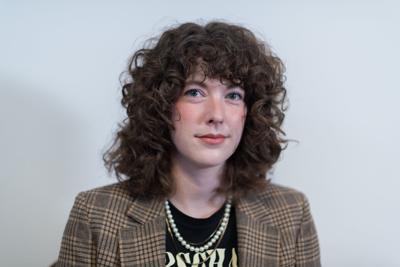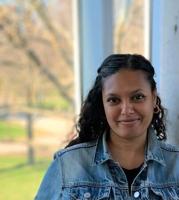
“Jesusland,” by Joelle Kidd, ECW Press,┬á$24.95.
“Jesusland: Stories From the Upside Down World of Christian Pop Culture” (ECW Press) is Joelle KiddÔÇÖs plunge into the complex and bizarre world of religious populism.
ÔÇťAdmittedly, itÔÇÖs a niche topic,ÔÇŁ Kidd writes in the book’s introduction, ÔÇťbut not as niche as one might think. Because just as often, when I reveal the topic of my book, the other personÔÇÖs eyes go wide. They know exactly what IÔÇÖm talking about.ÔÇŁ
ÔÇťThey, too, can still remember every lyric to their favourite Relient K song, had a subscription to Brio, or rocked a rubber Live Strong-style bracelet that instead read Jesus is King or Live for Him,ÔÇŁ she continues. ÔÇťLike anyone with experience with a niche subculture, finding a fellow former peer is a weird kind of homecoming.ÔÇŁ
Kidd is a journalist and editor living in ╔ź╔ź└▓. Her writing has appeared in The Walrus, LitHub, This Magazine and Prairie Fire.┬á

Joelle Kidd calls “Pan” “an incredible feat of literary fiction.”
What did you last read and what made you read it?
IÔÇÖm currently reading “Pan” by Michael Clune and itÔÇÖs blowing my mind. What made me read it was that it was (nearly forcibly) recommended to me by my dear friend Courtney, who loved it so much she brought her library copy to my book launch to give to me. ItÔÇÖs an incredible feat of literary fiction.
What book would your readers be shocked to find in your collection?
I donÔÇÖt think I have anything very shocking in my collection except for the books I purchased to research my book (all secondhand ÔÇö no money going into any right-wing evangelical pockets from me). If I ever go to someoneÔÇÖs house and spy “Jesus Freaks” or “Every Young ManÔÇÖs Battle” on their bookshelf, I will definitely know to turn and run.

The language in “Salt Fish Girl” “is so gorgeous,” says Joelle Kidd.
When was the last time you devoured a book in one, or very few, sittings?
I know IÔÇÖm late to discover it, but I recently read Larissa LaiÔÇÖs “Salt Fish Girl” and couldnÔÇÖt put it down. LaiÔÇÖs language is so gorgeous, and while IÔÇÖve read plenty of descriptive, tactile or taste-centric writing, I donÔÇÖt know that IÔÇÖve ever read a novel that paid such attention to scent.
WhoÔÇÖs the one author or whatÔÇÖs the one book youÔÇÖll never understand, despite the praise?
Stephen King. I feel safe saying that because he certainly doesnÔÇÖt need my readership. People are always quoting his writing advice to me and I always hate it, so maybe IÔÇÖm just bitter about that.
What’s the one book that has not garnered the success that it deserves?
IÔÇÖd say this category includes most books published in the last 10 years or so! I would love to see writers get more recognition for their hard work. IÔÇÖve been seeing firsthand how much work goes into publishing and promoting a book, and I think small and medium-sized independent presses deserve much more love!
What book would you give anything to read again for the first time?
One of my pivotal reading experiences was reading Italo CalvinoÔÇÖs “If on a WinterÔÇÖs Night a Traveler” when I was maybe 18 or 19. It begins in second-person address with a description of you, the character of the reader, opening the book and starting to read, then moves into successive chapters of false starts of different books, as the reader chases after the real story. Reading that book cracked literature open for me in some way.

“Howl’s Moving Castle,” Joelle Kidd says, “addressed struggles with identity, the question of who gets to say who you are, and what it means to grow up as a girl.”
When you were 10 years old, what was your favourite book?
Two books that come immediately to mind are “HowlÔÇÖs Moving Castle” by Dianna Wynne Jones and “The Princess Diaries” by Meg Cabot. On one hand, these feel pretty dissimilar ÔÇö oneÔÇÖs a fairy-tale-inflected whimsical fantasy and the other a diary novel about a New York teen who finds out sheÔÇÖs actually a European princess ÔÇö but looking back, both really addressed struggles with identity, the question of who gets to say who you are, and what it means to grow up as a girl. And having reread them both in adulthood I can vouch that they are both legitimately very smart and funny.

Joelle Kidd would like to be friends with Selin from “The Idiot.”
What fictional character would you like to be friends with?
Maybe this is a weird answer because itÔÇÖs autofiction, so IÔÇÖm essentially saying I want to be friends with the author, but I fell in love with Selin from Elif BatumanÔÇÖs “The Idiot” the second I started reading that book. In a lot of ways that book felt to me like I was reading a (smarter, more coherent) transcript of my own thoughts.
Do you have a comfort read that you revisit?
I grew up Mennonite in Winnipeg, Man., so you know IÔÇÖm a Miriam Toews fan. I revisit her books often. I find her novel “Irma Voth” really compelling in thinking about the collision of culture, religion and media.
What was the last book that made you laugh or cry?
“Human Acts” by Han Kang and “One Day, Everyone Will Have Always Been Against This” by Omar El-Akkad both recently made me cry.
“All Fours” by Miranda July, “Sucker Punch” by Scaachi Koul and “Hi, ItÔÇÖs Me” by Fawn Parker recently made me both laugh and cry, which I would say is quite a feat.
What is the one book you wish you had written?
The first time I read Sheila HetiÔÇÖs “How Should a Person Be?” I instantly began seething with envy wishing I had written it. I quickly got over that to enjoy what is clearly a brilliant and more singular book than I could have ever produced.

Reading Lili AnolikÔÇÖs “Didion & Babitz” made Joelle Kidd want to hang out with Eve Babitz.┬á
What three authors living or dead would you like to have a coffee with?
IÔÇÖm always quite scared of meeting my heroes, so I think I would pick impossible historical authors for this hypothetical coffee date. Reading Lili AnolikÔÇÖs “Didion & Babitz” made me want to hang with Eve Babitz, and I think if we invited Jean Genet, we could really get the party going. And letÔÇÖs throw Shakespeare in there too, so we can clear up any conspiracy theories and get confirmation that he was in fact a bisexual icon.
What does your definition of personal literary success look like?
Writing is something IÔÇÖve always wanted to do with my life, so to me it feels like a small spark IÔÇÖve been fanning into flame for a long, long time. I guess my version of success means keeping the fire going: being able to devote enough space and time and energy to my artistic practice to sustain some warmth.





































To join the conversation set a first and last name in your user profile.
Sign in or register for free to join the Conversation